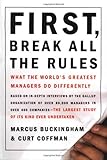In my former life in
consulting, I survived more management fads than I have fingers and toes. I
read countless management books, many of them contradictory and some of them
utterly ridiculous. I still read and review management/business books
occasionally. Here are five gems that I
can truly recommend to thoughtful readers.
First, Break all the Rules
As soon as I read the title of this book, I purchased it and read it cover to
cover. (I have a little problem with authorityJ) Based on two studies done by the Gallup
Organization, this book explains what successful managers do and what talented
employees need. The answers fly in the face of many generally accepted
management practices. For example, the most successful managers spend the most
time with their most productive employees. They also give employees objectives,
then turn them loose to achieve those objectives in whatever way they deem
best. They can do this because they select their employees for talent.
The Ultimate Business Library
This book is a trip down memory lane, with short chapters devoted to fifty
books that were each famous for a time. Remember The Third Wave, In
Search of Excellence, and Up the Organization?Titles
reviewed include The Prince, Principles of Scientific Management, and The
Fifth Discipline. I enjoyed this book because the author seems to be
as cynical about most management theory as I am.
Overachievement
This is more of a psychology book than a management book, but I found it
fascinating. The author is a Ph.D. who has made it his work to study high achievers:
athletes, lawyers, business managers, and students. Again, the findings
question conventional wisdom. For instance, we assume high achievers work
harder, always analyzing every move and studying every angle. Although hard
work has its place, Dr. Eliot finds that great performers, when they are doing
what they do best, are actually not thinking like that. They are focused only
on what they are doing in the moment: playing the violin, hitting the baseball,
or running fast. His discussion of the "training mindset" versus the
"trusting mindset" is alone worth the price of the book.
Intellectual Capital
America has moved from a manufacturing economy to an information economy.
Managers are trying to manage knowledge workers with the methods of the old economy-with
limited success. Stewart offers a new way of thinking about employees by
suggesting we use their minds as well as their hands. Learn how successful
companies are harnessing the power of the intellectual capital in their
organizations.
Generations at Work
The authors studied four generations of workers, whom they labeled: Veterans,
Boomers, Xers, and Nexters. They describe the pivotal events in the formative
years of each generation, e.g. World War II, Woodstock, the Challenger
disaster. The different attitudes and work habits of each generation are
explained and ideas are presented for getting different generations to work
together.
Any of these five management books would
truly be worth a few hours and a few dollars. There are no silly fads or psychobabble
in these books; in fact, you will probably find they confirm your own
experience and common sense.
References:
Buckingham, M. & Coffman, C. (1999). First,
break all the rules: What the world's greatest managers do differently. New
York: Simon & Schuster.
Cranier, S. (1997). The ultimate
business library: 50 books that shaped management thinking. New York:
AMACOM.
Eliot, J. (2004). Overachievement: The new
science of working less to accomplish more. New York: Penguin Group.
Stewart, T. (1997). Intellectual capital: The
new wealth of organizations. New York: Doubleday.
Zemke, R., Raines, C. & Filipczak, B. (2000). Generations
at work. New York: AMACOM.


































